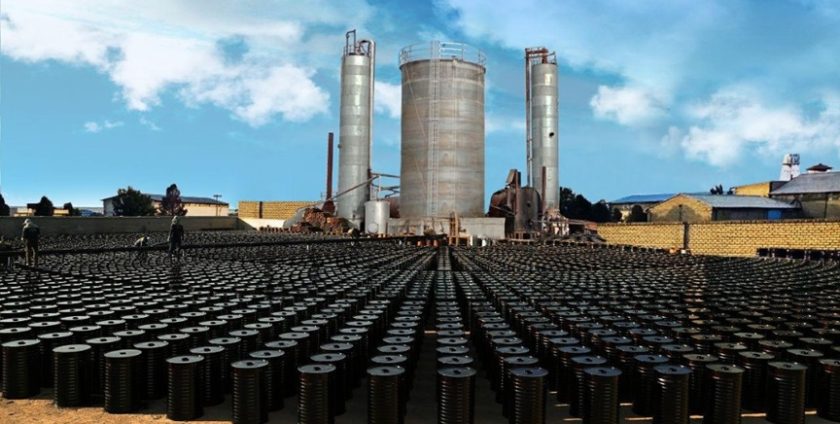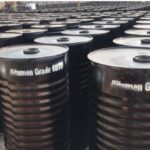
Penetration Bitumen: Its Types, Uses, Applications, Advantages & Disadvantages.
How is Penetration Bitumen produced ? Penetration bitumen is a fundamental material in the construction industry, particularly in road construction and maintenance. It is known for its ability to bind aggregates, providing durability and flexibility to pavements. In this comprehensive blog, we will explore how penetration bitumen is produced, its various types, uses, applications, advantages and disadvantages, future prospects, price factors, and why Peak Universal Business stands out as a top supplier. ( Production of Penetration Bitumen: Crude Oil Distillation, Vacuum Distillation, Air Blowing Process, Blending, Storage and Packaging )
What is Penetration Bitumen?
Penetration Bitumen, also known simply as penetration grade bitumen, is a type of bitumen used primarily in road construction and various other applications. It is characterized by its ability to penetrate a standard needle under specified conditions, which measures its hardness and consistency. This property is crucial as it determines the bitumen’s performance under varying temperatures and loads.
Production of Penetration Bitumen
The production of Penetration Bitumen involves several key steps: Crude Oil Distillation, Vacuum Distillation, Air Blowing Process, Blending, Storage and Packaging
- Crude Oil Distillation:
- Crude Oil Distillation – The process begins with the distillation of crude oil. In a distillation tower, crude oil is heated and separated into various fractions based on boiling points. The heavier fractions, which are not vaporized, are collected at the bottom and are used for producing bitumen.
- Vacuum Distillation:
- Vacuum Distillation – The heavier fractions undergo further processing in a vacuum distillation unit. This step reduces the pressure, allowing the heavy fractions to boil at lower temperatures, thus preventing thermal cracking. The residue from this process is known as vacuum residue, which is the primary feedstock for bitumen production.
- Air Blowing Process:
- Air Blowing Process – The vacuum residue is subjected to an air blowing process where hot air is blown through the material. This step increases the viscosity and modifies the properties of the bitumen to achieve the desired penetration grade. The extent of air blowing determines the final penetration grade of the bitumen.
- Blending:
- Blending – Depending on the required specifications, the air-blown bitumen may be blended with other components to achieve specific properties. Additives may be introduced to enhance the performance characteristics of the bitumen, such as improving its resistance to aging and deformation.
- Storage and Packaging:
- Storage and Packaging – The final product is stored in heated storage tanks to maintain its fluidity and prevent solidification. It is then packaged in various forms such as drums, bags, or bulk shipments, ready for distribution.
- How is Penetration Bitumen produced ?
Types of Bitumen
Penetration Bitumen is classified based on its penetration grade, which indicates its hardness. The common grades include:
- Penetration Grade 10/20:
- Very hard bitumen, suitable for high-temperature regions and heavy traffic conditions.
- Penetration Grade 30/40:
- Slightly softer than 20/30, suitable for moderate to high temperatures and heavy traffic.
- Penetration Grade 40/50:
- Medium-hard bitumen, used in areas with moderate temperatures and traffic loads.
- Penetration Grade 60/70:
- Commonly used in road construction, suitable for moderate climates and standard traffic.
- Penetration Grade 80/100:
- Soft bitumen, used in cooler climates and for less trafficked roads.
- Penetration Grade 100/150:
- Very soft bitumen, ideal for cold climates and light traffic conditions.
- How is Penetration Bitumen produced ?
Uses and Applications of Penetration Bitumen
Penetration bitumen is highly versatile, with numerous applications across different industries:
- Road Construction:
- Surface Dressing: Penetration bitumen is used for surface dressing, a process that involves spraying bitumen on road surfaces and covering it with aggregates to provide a protective layer.
- Hot Mix Asphalt (HMA): It is a primary component in the production of hot mix asphalt, which is used for constructing and resurfacing roads, highways, and runways.
- Bituminous Macadam: Used in the construction of bituminous macadam roads, offering a durable and smooth surface.
- Waterproofing:
- Penetration bitumen is used in waterproofing applications, including the construction of roofs, basements, and tunnels. Its water-resistant properties help prevent water ingress and protect structures from moisture damage.
- Industrial Applications:
- It is used as a binding agent in the manufacturing of various products such as roofing felt, pipe coatings, and adhesive materials. Bitumen’s adhesive properties and resistance to environmental factors make it ideal for these applications.
- Damp Proof Courses (DPC):
- Penetration bitumen is used in damp proof courses to prevent rising damp in buildings. It acts as a barrier, stopping moisture from penetrating through the walls and foundations.
- How is Penetration Bitumen produced ?
Advantages of Bitumen
Penetration Bitumen offers several advantages that make it a preferred choice in various applications:
- Durability:
- Penetration bitumen provides excellent durability, ensuring that road surfaces and other applications have a long lifespan. It resists wear and tear from traffic and environmental factors.
- Flexibility:
- It maintains its flexibility over a wide range of temperatures, preventing cracking in cold weather and rutting in hot conditions. This adaptability makes it suitable for different climatic regions.
- Adhesion:
- Penetration bitumen exhibits strong adhesive properties, binding aggregates effectively and forming a cohesive and durable layer. This ensures that the constructed surfaces remain intact under various stresses.
- Waterproofing:
- Its waterproofing capabilities make it an ideal material for applications where water resistance is crucial. It prevents water ingress and protects structures from moisture-related damages.
- How is Penetration Bitumen produced ?
Disadvantages of Penetration Bitumen
Despite its numerous advantages, Penetration Bitumen has some disadvantages:
- Temperature Sensitivity:
- Penetration bitumen is sensitive to temperature changes. It can become too soft in high temperatures, leading to deformation, and too hard in low temperatures, causing brittleness and cracking.
- Environmental Concerns:
- The production and use of bitumen have environmental impacts. The extraction and refining processes contribute to greenhouse gas emissions, and improper disposal can lead to environmental pollution.
- Health Hazards:
- Bitumen can pose health hazards during handling and application, including skin irritation and respiratory issues due to fumes. Proper safety measures are essential to mitigate these risks.
- How is Penetration Bitumen produced ?
Future Prospects of Penetration Bitumen
The future of penetration bitumen looks promising, with ongoing advancements aimed at improving its properties and expanding its applications:
- Innovative Additives:
- Researchers are exploring the use of innovative additives to enhance the performance of Penetration Bitumen. These additives can improve its resistance to aging, deformation, and temperature variations, making it more durable and versatile.
- Sustainable Alternatives:
- The development of sustainable alternatives to traditional bitumen is a key focus. Bio-based bitumen, produced from renewable resources, offers a greener option with reduced environmental impact. This shift towards sustainability aligns with global efforts to minimize carbon footprints and environmental pollution.
- Advanced Manufacturing Techniques:
- Continuous improvements in manufacturing techniques aim to enhance the quality and consistency of penetration bitumen. Advanced refining processes and chemical modifications can result in bitumen with superior properties for specific applications.
- Smart Infrastructure:
- The integration of smart technologies in road construction and maintenance can revolutionize the use of penetration bitumen. Self-healing bitumen and smart pavements equipped with sensors can monitor and respond to changes in traffic and environmental conditions, extending the lifespan of road surfaces.
- How is Penetration Bitumen produced ?
Price Factors
Several factors influence the price of Penetration Bitumen:
- Raw Material Costs:
- The price of crude oil, the primary raw material for bitumen, significantly impacts its cost. Fluctuations in the global oil market affect the overall price of penetration bitumen.
- Production Technology:
- Advanced production technologies can affect the overall cost of bitumen, with more efficient methods potentially reducing prices. Investments in state-of-the-art refining facilities and process optimization contribute to cost savings.
- Market Demand:
- The demand for penetration bitumen in various industries influences its market price. High demand can lead to increased prices. Market trends, economic conditions, and industrial growth rates all play a role in determining the price of bitumen.
- Quality and Grade:
- Different grades and qualities of penetration bitumen come with varying price points, with higher-quality bitumen commanding premium prices. The specific application requirements and performance characteristics of bitumen influence its market value.
- How is Penetration Bitumen produced ?
Peak Universal Business: Top Penetration Bitumen Supplier
Peak Universal Business stands out as a top supplier of high-quality Penetration Bitumen. Here’s why:
- Quality Assurance:
- Peak Universal Business ensures that its penetration bitumen meets the highest quality standards. Rigorous testing and quality control processes guarantee that the bitumen delivers optimal performance in various applications.
- Wide Range of Grades:
- Peak Universal Business offers a comprehensive range of penetration bitumen grades to cater to diverse industry needs. From hard bitumen for high-temperature regions to soft bitumen for cooler climates, they provide the right product for every application.
- Sustainable Practices:
- Committed to sustainability, Peak Universal Business adopts eco-friendly practices in its production processes. They invest in research and development to explore sustainable alternatives and reduce the environmental impact of bitumen production.
- Customer Support:
- Peak Universal Business provides excellent customer support, assisting clients in selecting the appropriate penetration bitumen for their specific requirements. Their knowledgeable team offers technical guidance and ensures timely delivery of products.
- Global Reach:
- With a strong global presence, Peak Universal Business serves clients worldwide, ensuring reliable and efficient supply chains. Their extensive distribution network guarantees that customers receive high-quality bitumen, no matter where they are located.
Conclusion
Penetration Bitumen is an essential material with diverse applications in road construction, waterproofing, industrial processes, and more. Its production involves complex processes to achieve the desired penetration grades, ensuring optimal performance in various conditions. While it has some disadvantages, ongoing advancements and sustainable practices are paving the way for a brighter future.
Peak Universal Business stands as a top supplier, offering high-quality Penetration Bitumen that meets industry standards and customer needs. With their commitment to quality, sustainability, and customer support, they are a reliable partner for all your bitumen requirements.
Whether you’re constructing roads, waterproofing structures, or manufacturing industrial products, penetration bitumen from Peak Universal Business is the ideal choice to ensure durability, performance, and efficiency in your projects.
Production of Penetration Bitumen: Crude Oil Distillation, Vacuum Distillation, Air Blowing Process, Blending, Storage and Packaging
📣 Call to Peak Universal Business – Partner with a Reliable Bitumen Supplier
📞 Looking for a Reliable Supplier of Penetration Bitumen?
We in Peak Universal Business deliver high-purity, industry-grade Penetration Bitumen for waterproofing and adhesive applications. Get in touch for bulk pricing, technical specs, or custom packaging.
🔹 Request a Quote | 🔹 Download TDS | 🔹 Speak to Engineer
👉 Request a Quote Today
📧 Email: [email protected]
📞 Phone: +971 4 878 2031
🌐 Visit: PUBLtd. Bitumen
If You have any other Query or Question you want to ask, Please don’t hesitate to Contact Us.
- 0 comment





Leave a Reply